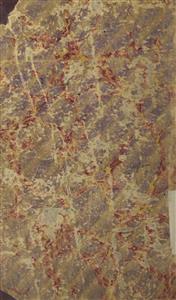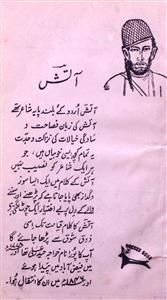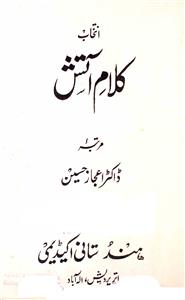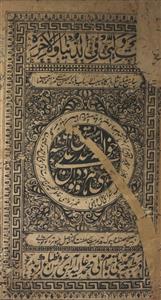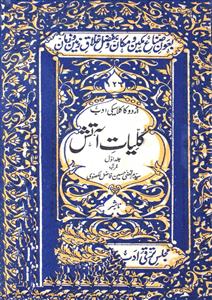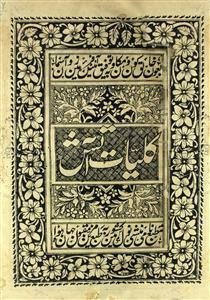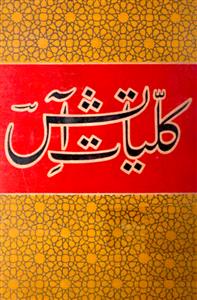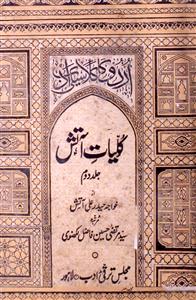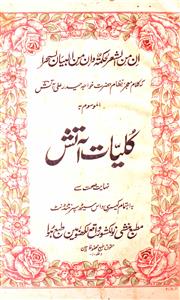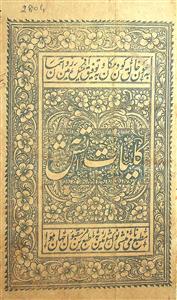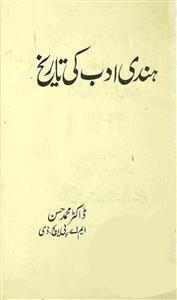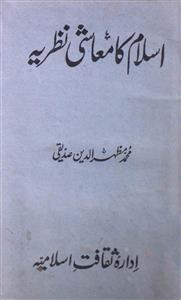 For any query/comment related to this ebook, please contact us at haidar.ali@rekhta.org
For any query/comment related to this ebook, please contact us at haidar.ali@rekhta.org
About The Book
خواجہ حیدر علی نام اور آتش ؔتخلص تھا۔آتش ایک ایسے شاعر ہیں جنھوں نے غزل کے سوا کچھ نہیں لکھا ۔انھوں نے شاعری کو "مرصع سازی" کا نام دیا تھا۔زیر نظر خواجہ آتشؔ کے دونوں دیوان یعنی دیوان اول اور دیوان دوم ایک ہی جلد میں پیش کئے گئے ہیں۔ جس میں ان کی تمام غزلیں موجود ہیں۔ان کا تمام کلام مرصع سازی اور بندش الفاظ پیش کرتا ہے۔آتش کے مزاج میں جو قلندرانہ شان تھی وہ ان کی شاعری میں بھی نظر آتی ہے۔آتش کے کلام کاشمار اردو کے شعراکے شیریں کلام میں ہوتا ہے۔ان کے کلام میں زبان کا حسن اور جذبے کی صداقت گھل مل گئے ہیں۔یہی ان کا سب سے بڑا کارنامہ ہے۔آتش کے خیالات بلند اور زبان دلکش ہے۔ان کا لہجہ بلند آہنگ ہے ۔ان کی غزلیں حسن و جمال ، عشق کی کیفیتوں ،دلی وارداتوں اور تصوف کے موضوعات سے لبریز ہیں۔ان کے کلام میں سادگی ،رنگینی اور درد و اثر ہے۔زبان کی صفائی اور محاورات کا برمحل استعمال ان کے کلام کی دیگر خصوصیات میں شامل ہیں۔آتش کا انداز بیان اپنی ایک انفرادیت رکھتا ہے۔
About The Author
Khwaja Haider Ali Atish (1777-1847), who hailed from a Sufi family of Delhi, was born in Faizabad. After spending his adolescent years there, he shifted to Lucknow which was then the goal of all literary dilettantes and masters. Neither associated with a court, nor influenced by the privileged and the powerful, Atish enjoyed his self-respect and courage of conviction. True to his spirit, he refused to be carried away by the splendour of the people in high places, and preferred to lead the life of a liberal Sufi and devote himself to the vocation of poetry.
Atish was a disciple of Mus’hafi and wrote both in Persian and Urdu. He is, however, remembered for his Urdu poetry as his Persian poetry has remained untraceable. He was extremely resourceful with the Urdu idiom and played upon the softness of its tone. Striking a balance between the odds and the evens in his poetry, he was now spontaneous now remote, now restrained now sentimental, now ratiocinate now mystical. His sincere sentiments and robust language blended well to create a condition of lasting appeal. Even while he maintained a uniform level of expression, he also turned wordy and flamboyant at times, but remained simple and eminently accessible. Atish chose to philosophise on the pleasures of flesh and delve deeper to discover the ecstatic moments of union. The cumulative impact that Atish creates is that of a poet who has a healthy attitude towards life and art and expresses himself with remarkable vigour and vitality. He brought life to bear upon art, and art on life. He has left behind two divaans that exemplify his independent and proud poetic stance.
 For any query/comment related to this ebook, please contact us at haidar.ali@rekhta.org
For any query/comment related to this ebook, please contact us at haidar.ali@rekhta.org
Write a Review
Jashn-e-Rekhta 10th Edition | 5-6-7 December Get Tickets Here
